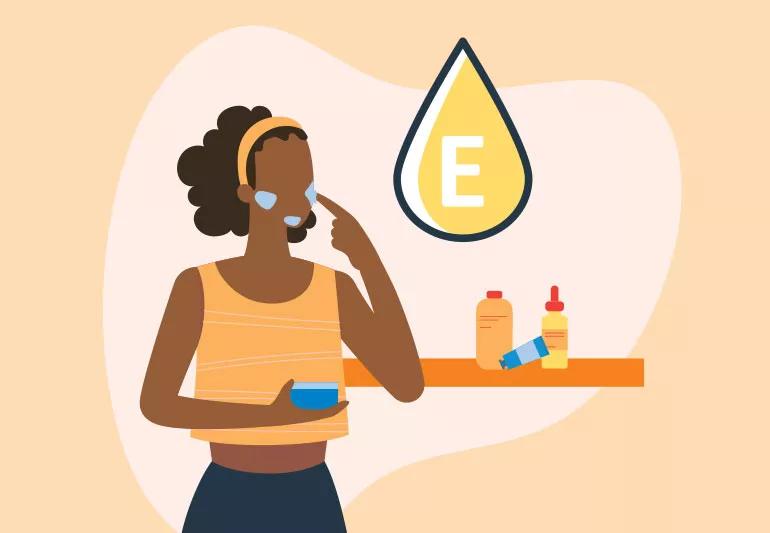Learn what this essential nutrient can do for you and how to use it to tackle skin woes

Vitamins, minerals and botanicals are touted as moisturizing powerhouses that make skin smooth, supple and radiant. Vitamin E is commonly listed among them, and some people also take it as a supplement. But is vitamin E for skin health really beneficial or just a marketing ploy?
Advertisement
Cleveland Clinic is a non-profit academic medical center. Advertising on our site helps support our mission. We do not endorse non-Cleveland Clinic products or services. Policy
Dermatologist Amy Kassouf, MD, explains the role vitamin E plays in skin care and gives the lowdown on whether it really treats conditions like dryness, wrinkles and sun damage.
Vitamin E is a fat-soluble vitamin that acts as an antioxidant, helping protect cells from damage throughout your body. It’s found in our sebum (skin oil), which creates a natural barrier to keep moisture in your skin. So oilier skin surfaces, like the face, contain greater amounts of vitamin E. And since people with oily skin have more sebum, they also have more vitamin E on their skin.
Sebum, along with vitamin E levels, naturally declines with age. Vitamin E is also depleted by ultraviolet light (UV) sources like:
The research on how vitamin E benefits skin is ongoing.
“It probably makes moisturizers work better, but it’s unclear in most studies if it has a direct medicinal role,” says Dr. Kassouf. “Its effects are fairly subtle. It doesn’t treat any particular skin condition other than helping a bit with general skin aging and lack of moisture.”
In moisturizers, vitamin E:
Advertisement
The evidence isn’t clear-cut yet, says Dr. Kassouf, but vitamin E may also reduce sun damage by absorbing UVB rays and reducing your skin’s inflammatory response, which includes:
But don’t replace your sunscreen with vitamin E oil. Two types of UV light damage the skin: ultraviolet A (UVA) and ultraviolet B (UVB).
Vitamin E can absorb some UVB light, but not all of it. In addition, vitamin E doesn’t protect against UVA light, which can lead to sunburns and skin cancer. And multiple studies have proven that vitamin E doesn’t prevent or help treat skin cancers.
So, it’s important to keep up your daily routine of applying sunscreen to protect your skin.
There are multiple ways you can use vitamin E to protect your skin.
“People with dry, flaky skin are more likely to see a benefit from using vitamin E because it enhances moisturization,” says Dr. Kassouf.
But if you have oily, acne-prone skin, you don’t need extra vitamin E. You’re getting enough in your sebum production.
Topical vitamin E oil penetrates the surface and protects the top and middle layers of the skin.
“For people who need their skin to be less dry and itchy, vitamin E seems to do a good job of that,” she says.
“Using a moisturizer that contains vitamin E may produce a nice synergy to help the product work better at keeping the skin cells intact,” says Dr. Kassouf. “And it also prevents other substances from penetrating the skin and causing irritation.”
To incorporate it into your skin care routine, look for products that contain vitamin E. Labels typically list it as tocopherol or tocotrienol. Moisturizers with as little as 0.1% can improve vitamin E levels in skin. Even better are products that include both vitamin C and E. These antioxidants work better together.
“You need to get enough vitamin E in your diet, ideally through food, but supplements are also an option,” says Dr. Kassouf. “We’re starting to see in studies that internal antioxidants may help protect us from external threats like sun damage.”
Foods high in vitamin E include:
For supplements, Dr. Kassouf says adults should stick to the recommended dietary allowance of 15 milligrams a day. Avoid overdoing it because excess vitamin E is stored in fat. It can build up to toxic levels, too. She recommends talking to your healthcare provider before starting any supplements.
Advertisement
Vitamin E can’t make your wrinkles disappear or prevent sunburn. But applying products with vitamin E can benefit dry skin. And when consumed in the right amount, vitamin E may also help your skin stand up to environmental stressors from the inside out.
Advertisement
Learn more about our editorial process.
Advertisement

It’s a great disinfectant for around your home, but not for your skin

Changes in texture, smell, color and performance are signs it’s time to throw the cosmetic item away

Strengthening your skin barrier, simple routines and minimizing products are ongoing, popular trends

Moisturizing, running a humidifier and adjusting your showers may help keep itchiness and irritation at bay

Glycolic acid benefits skin tone, texture and pigmentation by exfoliating dead skin

Some gentle soap and warm water go a long way when you’re washing these cosmetic tools regularly

New formulas are less drying and contain water-based and skin-loving ingredients

At a minimum, in the morning, apply a cleanser, followed by a moisturizer and sunscreen, in that order

Wearing a scarf, adjusting your outdoor activities and following your asthma treatment plan can help limit breathing problems

Your diet in the weeks, days and hours ahead of your race can power you to the finish line

When someone guilt trips you, they’re using emotionally manipulative behavior to try to get you to act a certain way